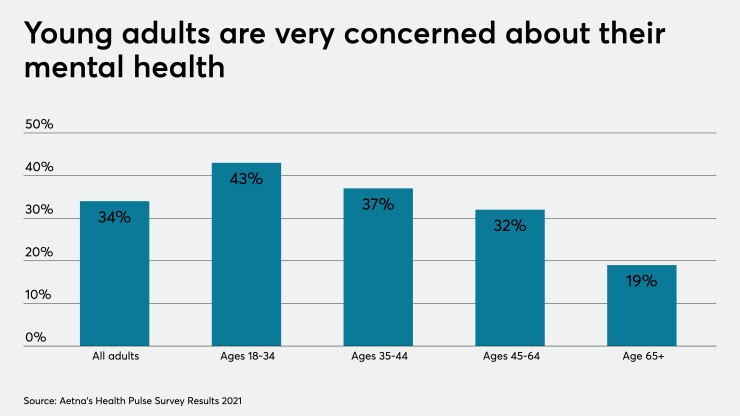Young adults may be less susceptible to the physical dangers of COVID, but when it comes to the societal repercussions, Gen-Z and millennials are suffering.
Sixty-five percent of young adults between the ages 18 and 34 are concerned about the mental health of those around them, and 43% are increasingly concerned about their own
The issue is nothing short of a matter of perception, according to Cara McNulty, president of behavioral Health & EAP at Aetna.
“As a society, it has caught people off guard because if you go back to the most digitally connected and the most technically savvy, it’s the younger population,” McNulty says. “And yet, we see them experiencing the most isolation and loneliness and grief.”
Read more:
One in four 18 to 24 year olds said that they have thought about self harm during the pandemic, and more than half reported at least one negative mental health symptom — such as depression or anxiety — in light of COVID-19, according to a study conducted by the Center for Disease Control.
The term coined to describe what Gen-Z is experiencing is “micro-losses,” according to McNulty. It accounts for everything from graduation cancellations to an
“You can't compare a loss of life and not being able to go to the prom,” McNulty says. “But when you're 16 and you’ve experienced all of these micro-losses, or when you’re 25 and you're having a really hard time finding a job because your internship got canceled, those micro-losses are festering and they're adding up to one grand loss.”
On top of the psychological impacts of the pandemic, younger generations are also grappling with a spike in
In response to the growing mental health crisis, CVS Health launched an initiative called Here 4 U in Feburary of this year, a set of digital, communal conversations aimed at the communities disproportionately affected by COVID-19. Recently the initiative held a virtual group counseling session for young adults, guided by licensed therapists.
Read more:
“When we look at our pre- and post-data from our Here 4 U sessions, we see these kids coming in feeling isolated and lonely and leaving feeling resilient and hopeful,” McNulty says.
Moving forward, McNulty urges others to put aside preconceived notions surrounding mental health in regards to specific age groups and to instead continue the de-stigmatization of the conversation around mental health and lead with empathy.
“It's really important that we're looking at the impact of mental health in totality on the population instead of thinking that there are groups that go unscathed,” she says. “Whether it's Gen-Z or millennials this is probably one of the most traumatic experiences they've had in a long time.”






